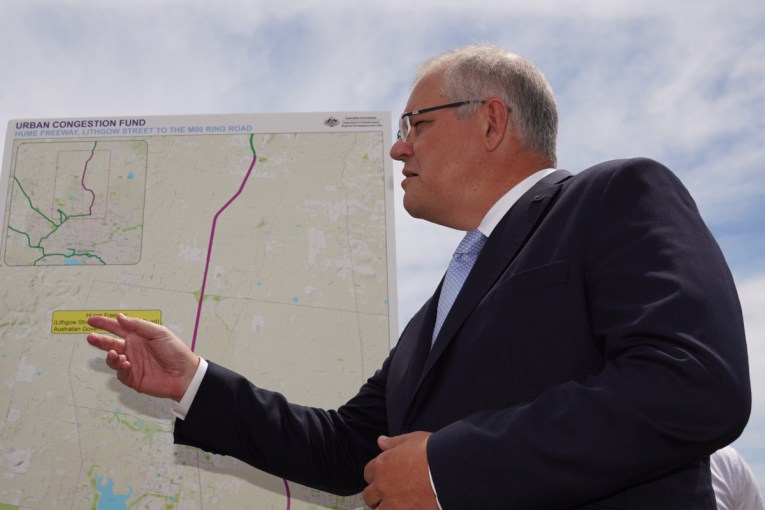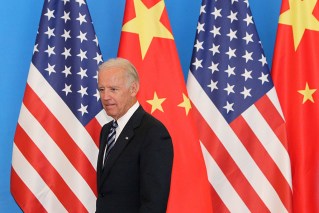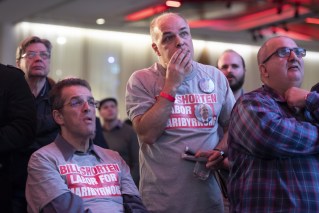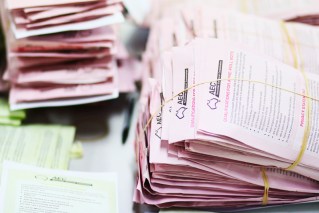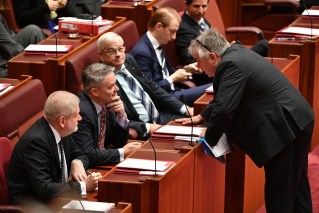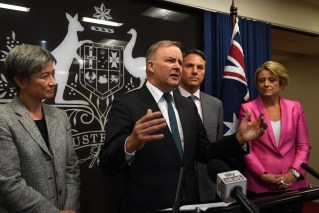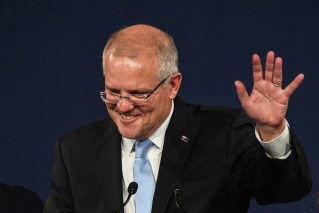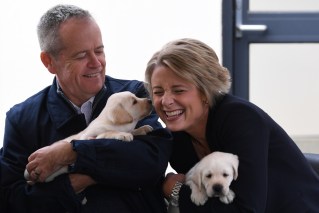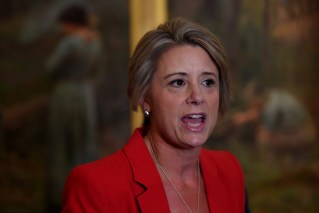Election 2019: The seats where Labor and Liberals are pinning their hopes
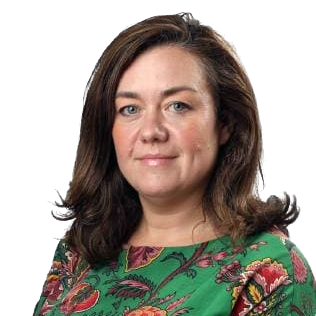
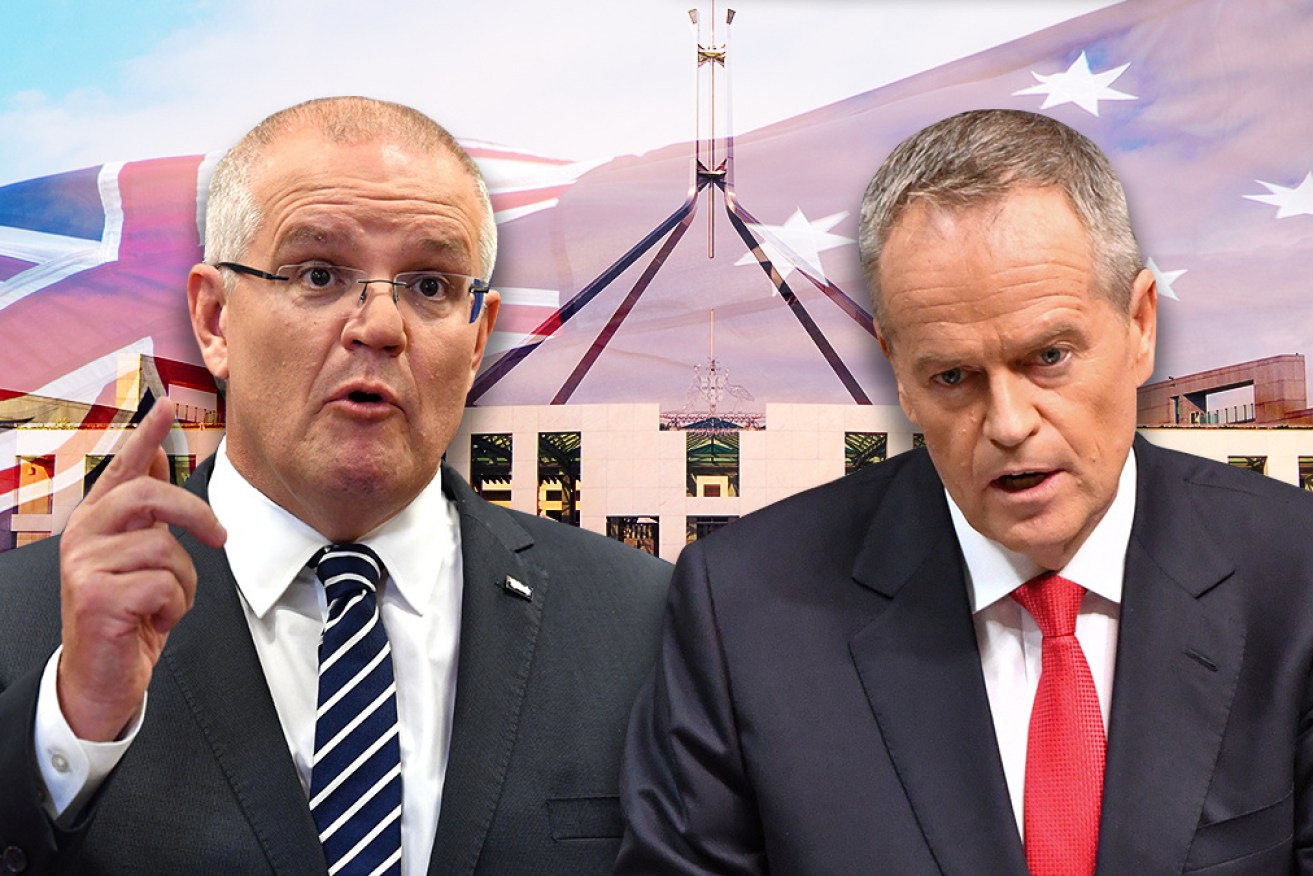
Scott Morrison and Bill Shorten have put it all on the line. Now their fate is in the hands of voters. Photo: Getty
Bill Shorten is on track to be elected Australia’s next Prime Minister on Saturday, but his majority will likely be slim – in the region of 78 to 82 seats.
It’s a long way from a landslide.
And jittery Labor MPs fear the unpredictable impact of Clive Palmer’s United Australia Party preferences, fuelled by a $50 million-plus advertising spend, could still shred their margin and risk minority government.
The final Newspoll of the campaign has Labor ahead of the coalition 51.5 to 48.5 on a two-party preferred basis, while the latest Ipsos poll shows Labor in front 51-49.
In Newspoll, Labor has increased its lead on a two-party-preferred basis to 51.5 per cent to the Liberals’ 48.5 per cent. The result represents a 0.5 per cent lift for Labor.
Labor’s primary vote is unchanged at 37 per cent, but the Liberals’ primary is down from 39 per cent to just 38 per cent.
The Greens primary vote is unchanged on 9 per cent and the United Australia Party unchanged at 4 per cent. One Nation was down again to 3 per cent.
The Liberals believe their best-case scenario is now minority government with conservative independents – a prospect the Prime Minister left open to negotiation on Friday “in the national interest”.
The Morrison Government remains quietly hopeful that the two conservative warriors targeted by GetUp! and unions, Peter Dutton in the Brisbane seat of Dickson and Tony Abbott in Warringah, can hang on in a result that could provide a silver lining for conservatives.
The big unknown: how will undecided voters react to the death of Labor legend Bob Hawke?
That remains a mystery, although the death of Australia’s larrikin former PM did overshadow the final day of campaigning.
On Friday night, Bob Hawke’s haunting of Scott Morrison continued as a larger-than-life image of the Labor leader loomed on a big screen over the Prime Minister during a live television interview in Bombaderry, NSW.
https://twitter.com/ramklar/status/1129303130070405120
This election all comes down to Victoria and Western Australia.
That’s because the ALP remains pessimistic of net seat gains in NSW, Queensland and South Australia.
Ominously for Labor, there are also up to two marginal ALP seats in Tasmania – Bass and Braddon – still in play.
“This election will be close and every Australian’s vote will matter. Every Australian’s choice will matter and that is exactly as it should be,” Mr Morrison said.
The Prime Minister stressed that now was not the time to risk Labor’s “big spending, big taxing” agenda.
Mr Shorten declared it was time for change after the chaos of the Abbott-Turnbull-Morrison governments, and he boasted Labor’s agenda is the most ambitious since Whitlam and Hawke.
Let's end the chaos. Let’s vote for change. Let’s win this. pic.twitter.com/gVRF1OGY6m
— Bill Shorten (@billshortenmp) May 17, 2019
“We want to make transformational changes on climate change,” Mr Shorten said.
“Bob Hawke wouldn’t have time to deal with our nitpicking, he would have said ‘just bloody do it’,”
“What we want to do is to take the inter-generational scam out of taxation, Hawke and Keating were big backers of what I and Chris Bowen are proposing.”
According to Newspoll, the swing to Labor, compared to the last election, is a slender 1.9 per cent. That translates to 81 seats and a four-seat buffer in the 151-seat Parliament after a Labor speaker is provided.
The Prime Minister confirmed on Friday that the Liberals are prepared to negotiate with conservative independents if they cannot secure an outright majority.
“If that were to occur – and this is a very tight election … incredibly close – then obviously we would work in Australia’s national interests and seek to continue the government and the good government, the strong economy being put in place,” Mr Morrison said.
Big day campaigning today. Now in Gladstone for a retiree forum with Ken O’Dowd, listening to concerns about the impact Labor’s Retiree Tax will have on them. Over 1m Australians will be hit by this tax. Only a vote for Ken & the Liberal-Nationals will stop Labor’s higher taxes. pic.twitter.com/pjgaNWgs8M
— Scott Morrison (@ScoMo30) May 17, 2019
But Mr Morrison warned that if Labor cannot form a government in its own right it cannot claim a mandate for big reforms, including negative gearing and dividend imputation tax changes.
“It would also mean that Bill Shorten, if he does not achieve a majority in the Parliament, then his case for change wouldn’t have been accepted by Australia,” he said.
Labor remains confident it can form a majority government.
While Labor in theory only needs to gain four seats to govern, it is expected to lose the seat of Lindsay in New South Wales, with the Queensland ALP-held seat of Longman also in play.

Warren Mundine’s prospects of retaining Gilmore for the Coalition appear to be fading. Photo:AAP
Gilmore in NSW, being contested for the Liberals by Warren Mundine, could fall to Labor. But the ALP is not confident of securing Reid in Sydney.
There are no seats expected to change hands in South Australia, where Liberal Nicole Flint is expected to hang on in Boothby.
Labor seats are also at risk in Tasmania – Braddon and Bass. Although the ALP is confident the latter is okay, the fight in Braddon remains “tight.”
In the Northern Territory, where there early fears for the seat of Solomon due to the poor performance off the Gunner Government, that concerns seems to be receding.
In Victoria, the Labor Party expects to pick up three to five Liberal seats, starting with Dunkley and Chisholm.
Mr Morrison spent Friday night with his family in Sydney while Bill Shorten was returning to his hometown of Melbourne.
For years, Australia has heard Western Sydney is the epicentre of swinging voters.
This time, it’s Victoria and Western Australia that will deliver Bill Shorten and the Labor Party the seats it needs to govern – or not.
